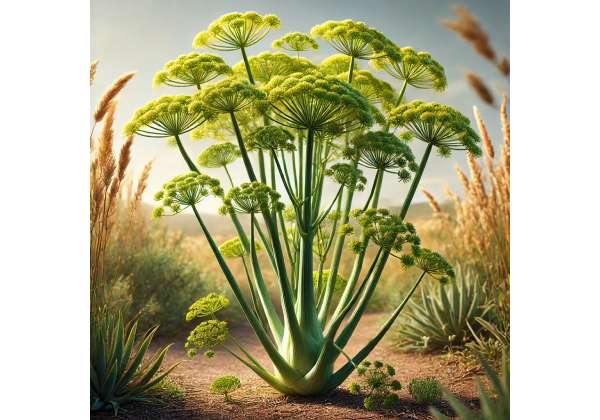
Fennel is a versatile and aromatic herb that has been cherished for centuries, both as a culinary delight and a powerful natural remedy. Known for its sweet, anise-like flavor and crisp texture, fennel has long been a staple in Mediterranean, Indian, and Middle Eastern cuisines. Beyond its culinary appeal, fennel is packed with essential nutrients and bioactive compounds that provide a wide range of health benefits—from aiding digestion and reducing inflammation to boosting the immune system and protecting against oxidative stress.
Cultivated since ancient times, fennel has a rich history intertwined with cultural traditions and herbal medicine practices. Its seeds, fronds, and bulb are all used in various preparations, each offering unique flavors and therapeutic properties. Whether you’re savoring a crunchy fennel salad, brewing a soothing fennel tea, or using its extract in natural skincare products, this herb brings both flavor and wellness to your daily life.
- Aids digestion and relieves bloating and gas
- Reduces inflammation and supports heart health
- Provides antioxidant protection and boosts the immune system
- Enhances respiratory function and helps clear congestion
- Promotes healthy skin and supports wound healing
- Adds a distinct, aromatic flavor to a variety of dishes
Table of Contents
- Fennel Botanical Profile: Taxonomic Overview and Visual Characteristics
- Fennel Historical Overview: Ancient Cultivation and Cultural Legacy
- Fennel Phytochemical Profile: Active Compounds and Nutritional Constituents
- Fennel Health Benefits: Therapeutic Properties and Functional Advantages
- Fennel Uses and Safety: Culinary Applications and Consumption Guidelines
- Fennel Research Highlights: Key Studies and Scientific Evaluations
- Fennel FAQs: Common Questions and Concise Answers
Fennel Botanical Profile: Taxonomic Overview and Visual Characteristics
Fennel, scientifically known as Foeniculum vulgare, belongs to the Apiaceae family—a diverse group of plants that includes carrots, parsley, and celery. This herb is prized not only for its culinary uses but also for its striking appearance. Fennel’s tall, feathery fronds, crisp white bulb, and delicate yellow flowers make it an eye-catching addition to any garden or kitchen.
Taxonomic Classification
- Kingdom: Plantae
- Clade: Angiosperms
- Clade: Eudicots
- Order: Apiales
- Family: Apiaceae
- Genus: Foeniculum
- Species: Foeniculum vulgare
Morphological Characteristics
Fennel is a hardy, perennial herb that can grow up to 2 meters in height under ideal conditions. Its distinct parts include:
- Fronds:
The feathery, finely divided leaves of fennel are reminiscent of dill. These fronds are not only decorative but also highly aromatic, releasing a sweet, anise-like fragrance when crushed. - Bulb:
At the base, fennel forms a crisp, white, bulbous stem. This bulb is edible and is used in a variety of dishes, providing a crunchy texture and a mild, sweet flavor that pairs well with a range of ingredients. - Flowers:
In late summer, fennel produces delicate yellow flowers that are arranged in umbrella-like clusters called umbels. These blossoms attract a variety of pollinators, including bees and butterflies, contributing to the ecological value of the plant. - Seeds:
Once the flowers have faded, fennel produces aromatic seeds. These seeds are a key spice in many cuisines and are also used in traditional herbal remedies for their digestive benefits.
Growth Habits and Natural Habitat
Fennel thrives in full sun and well-drained soil. It is highly adaptable and can be found growing wild in many parts of the Mediterranean region, as well as in other temperate and subtropical areas around the world. The plant’s deep root system and robust growth make it a resilient crop, capable of withstanding periods of drought and poor soil conditions.
Gardeners appreciate fennel for its dual role as both an ornamental and a culinary herb. Its striking appearance and enticing fragrance make it a popular choice in herb gardens and mixed perennial borders. Additionally, its ecological benefits, such as attracting pollinators, contribute to a healthy garden ecosystem.
Fennel Historical Overview: Ancient Cultivation and Cultural Legacy
Fennel has been a cherished herb throughout history, celebrated by ancient civilizations for its versatility, flavor, and medicinal properties. Its use dates back thousands of years, with evidence of fennel cultivation found in archaeological sites across the Mediterranean, Middle East, and Asia.
Ancient Cultivation and Uses
Ancient Egyptians, Greeks, and Romans all valued fennel highly. It was grown not only as a food crop but also for its medicinal qualities. In ancient Rome, fennel was associated with fertility and was often consumed during festivals to promote health and vitality. The herb’s aromatic qualities made it a favorite for flavoring foods, while its therapeutic properties were documented in early medical texts.
- Egyptians:
In ancient Egypt, fennel was used both as a culinary spice and as a medicinal remedy. It was believed to aid digestion and was incorporated into various rituals and offerings. - Greeks and Romans:
The Greeks and Romans praised fennel for its sweet flavor and therapeutic properties. It was commonly used to treat digestive issues, relieve headaches, and as a diuretic. Fennel was also featured in art and literature, symbolizing abundance and well-being.
Medieval and Renaissance Eras
During the medieval period, fennel continued to be an important herb in European herbal medicine. Monasteries and apothecaries cultivated fennel for its healing properties, using it to treat a range of ailments from digestive disturbances to respiratory issues. By the Renaissance, fennel had become a staple in both the culinary and medicinal practices of Europe, and its use spread to the New World with European settlers.
Modern Cultural Significance
Today, fennel remains a popular herb worldwide. It is a key ingredient in many traditional dishes, such as Italian roasted fennel, French fennel salad, and Indian masala. Its seeds are used in spice blends and herbal remedies, while its bulb is enjoyed fresh, cooked, or pickled. The herb’s long-standing presence in culinary traditions is matched by its respected role in modern herbal medicine, where it is often recommended for its digestive, anti-inflammatory, and antioxidant properties.
Modern herbalists and nutritionists continue to celebrate fennel not only for its flavor but also for its robust nutritional profile and health benefits. Its enduring legacy as a multi-purpose herb underscores its timeless appeal and the deep cultural connections it has fostered across civilizations.
Fennel Phytochemical Profile: Key Active Compounds and Nutritional Constituents
Fennel is renowned for its rich phytochemical profile, which underpins many of its health benefits. Modern research has identified a variety of bioactive compounds in fennel that contribute to its anti-inflammatory, antioxidant, and digestive properties. This robust composition is one of the reasons why fennel is considered a “superfood” and an invaluable component of a balanced diet.
Major Nutritional Components
Fennel is not only flavorful but also nutritionally dense. It is an excellent source of:
- Vitamins:
Fennel provides high levels of vitamin C, which supports the immune system, as well as various B vitamins that are crucial for energy metabolism. - Minerals:
Rich in potassium, calcium, and magnesium, fennel contributes to cardiovascular health, strong bones, and proper muscle function. - Dietary Fiber:
High fiber content in fennel aids in digestion, promotes satiety, and helps regulate blood sugar levels.
Key Bioactive Phytochemicals
- Essential Oils:
The essential oil of fennel, which gives it its distinctive aroma and flavor, is composed mainly of anethole. Anethole is a potent compound with antimicrobial, anti-inflammatory, and estrogenic properties. - Flavonoids:
Fennel contains various flavonoids that act as antioxidants, protecting cells from oxidative damage and reducing the risk of chronic diseases. - Phenolic Compounds:
These compounds work synergistically with flavonoids to enhance the herb’s antioxidant capacity. They contribute to the overall protective effects of fennel against environmental stressors. - Furocoumarins:
Present in smaller amounts, these compounds have been studied for their potential anti-cancer properties, although their use requires careful consideration due to potential photosensitivity. - Dietary Fiber:
Beyond its role in digestion, the fiber in fennel helps modulate the absorption of nutrients and supports gut health by promoting a healthy microbiome.
Extraction and Bioavailability
Traditionally, fennel is used fresh or dried in various culinary and medicinal preparations. Modern extraction techniques, such as steam distillation and solvent extraction, are employed to isolate and concentrate its essential oils and other bioactive compounds. These methods help ensure that fennel’s beneficial compounds are readily bioavailable, making them more effective when consumed or applied topically.
Synergistic Interactions
The health-promoting effects of fennel are amplified by the synergistic interaction between its multiple components. For instance, the combined antioxidant effects of its flavonoids and phenolic compounds create a robust defense system that protects the body from oxidative stress. This synergy enhances fennel’s overall effectiveness in supporting health and preventing disease.
Understanding the phytochemical profile of fennel provides valuable insights into why this herb has been so highly valued throughout history. Its blend of essential nutrients and bioactive compounds makes it a powerful ally in promoting health and well-being.
Fennel Health Benefits: Therapeutic Properties and Functional Advantages
Fennel is a true powerhouse when it comes to health benefits. Its unique combination of vitamins, minerals, and bioactive compounds makes it one of nature’s most effective tools for supporting overall well-being. Whether used in cooking or taken as a herbal remedy, fennel offers a wide range of benefits that can enhance your quality of life.
Major Health Benefits
- Digestive Health:
Fennel is widely known for its ability to soothe the digestive system. Its high fiber content promotes healthy bowel movements, while its essential oils stimulate digestion and help relieve bloating, gas, and indigestion. - Anti-Inflammatory Effects:
The anti-inflammatory properties of fennel, largely due to its essential oil anethole and various flavonoids, help reduce inflammation in the body. This can be particularly beneficial for individuals suffering from inflammatory conditions such as arthritis. - Antioxidant Protection:
Fennel’s rich array of antioxidants protects cells from oxidative damage. By neutralizing free radicals, fennel supports overall cellular health and may reduce the risk of chronic diseases associated with aging. - Immune System Support:
The vitamins and minerals in fennel, especially vitamin C and various B vitamins, bolster the immune system. This support helps the body fight off infections and recover more quickly from illnesses. - Respiratory Benefits:
Traditionally, fennel has been used to relieve respiratory issues such as coughs, bronchitis, and congestion. Its soothing properties help clear the airways and ease breathing. - Hormonal Balance:
Fennel contains phytoestrogens, which can help balance hormonal levels in the body. This is particularly beneficial for women experiencing menopausal symptoms or hormonal imbalances. - Heart Health:
The potassium in fennel plays a key role in regulating blood pressure and supporting cardiovascular health. Additionally, its anti-inflammatory and antioxidant properties contribute to a healthy heart.
Mechanisms of Action
The multifaceted health benefits of fennel arise from several key mechanisms:
- Enhancing Digestive Function:
Fiber, along with the stimulating action of fennel’s essential oils, improves digestion and helps maintain a healthy gut environment. - Reducing Inflammation:
Bioactive compounds in fennel inhibit inflammatory pathways, reducing the production of inflammatory mediators and alleviating pain. - Neutralizing Free Radicals:
The potent antioxidants in fennel work to scavenge harmful free radicals, thereby protecting cells from damage and supporting long-term health. - Supporting Immune Function:
The synergistic effect of fennel’s vitamins, minerals, and antioxidants enhances immune cell function, ensuring a robust response to infections.
Integrating Fennel into Your Daily Routine
Fennel is incredibly versatile and can be incorporated into your routine in many enjoyable ways:
- Culinary Uses:
Enjoy fennel raw in salads, roasted as a side dish, or pickled as a tangy condiment. Its crisp texture and unique flavor can enhance a wide variety of meals. - Herbal Teas:
Brew fennel seeds into a soothing tea that aids digestion and helps calm the stomach. This is a popular remedy for relieving bloating and indigestion. - Dietary Supplements:
Standardized fennel extracts are available in capsule form, providing a convenient way to receive its benefits daily. - Aromatherapy and Topical Applications:
Fennel essential oil can be used in diffusers to promote a calming atmosphere or diluted in a carrier oil for a relaxing massage.
By weaving fennel into your lifestyle, you can enjoy its comprehensive range of health benefits, supporting everything from your digestive system to your heart health and beyond.
Fennel Uses and Safety: Culinary Applications and Consumption Guidelines
Using fennel is both a delightful culinary experience and a practical way to support your health. Here are some practical tips on how to prepare, use, and safely enjoy fennel in various forms.
Culinary Applications
- Fresh Fennel Bulb:
The crisp, white bulb of fennel is a favorite in salads, offering a refreshing crunch and a mildly sweet flavor. It can also be roasted or grilled to bring out its natural sweetness. - Fennel Fronds:
The feathery, green fronds are not only decorative but also flavorful. They can be chopped and used as a garnish or incorporated into sauces, dressings, and soups. - Fennel Seeds:
Fennel seeds are a key spice in many cuisines, known for their potent anise-like flavor. They are commonly used in spice blends, baked goods, and herbal teas to support digestion. - Pickled Fennel:
Pickling fennel bulb slices creates a tangy, crunchy condiment that pairs well with a variety of dishes, from sandwiches to grilled meats.
Preparation Methods
- Herbal Teas:
Use 1-2 teaspoons of fennel seeds per cup of boiling water. Steep for 10 minutes, strain, and enjoy a warm, soothing cup of fennel tea. - Cooking with Fresh Fennel:
When using the fennel bulb, wash and slice it thinly. It can be eaten raw in salads or cooked in a variety of dishes—roasting enhances its natural sweetness. - Extracts and Supplements:
For those who prefer a more concentrated dose of fennel’s bioactive compounds, fennel extracts are available in liquid or capsule form. Follow the manufacturer’s instructions for dosage. - Essential Oils:
Fennel essential oil, extracted from its seeds, can be used in aromatherapy or diluted in a carrier oil for topical application. Always perform a patch test before using essential oils on your skin.
Safety Considerations
While fennel is generally safe for most people, it’s important to consider a few safety guidelines:
- Moderation:
As with any herb, it’s best to consume fennel in moderation. Excessive intake, especially of fennel seeds or concentrated extracts, may cause digestive discomfort. - Allergy Awareness:
Some individuals may be allergic to fennel. If you experience any signs of an allergic reaction, such as itching, swelling, or difficulty breathing, discontinue use and consult a healthcare provider. - Special Populations:
Pregnant or breastfeeding women should consult with a healthcare provider before using fennel supplements or essential oils, as the effects of high doses are not fully understood. - Quality Control:
Always purchase fennel products from reputable sources to ensure they are free from contaminants and have been properly processed to retain their beneficial properties.
By following these guidelines, you can safely incorporate fennel into your diet and wellness routine, enjoying its numerous benefits while minimizing any potential risks.
Fennel Research Highlights: Notable Studies and Scientific Evaluations
Modern scientific research is continually uncovering the benefits of fennel, providing a robust foundation for its traditional uses. Numerous studies have examined its antioxidant, anti-inflammatory, and digestive properties, offering valuable insights into how fennel can contribute to overall health.
Key Studies on Antioxidant and Anti-Inflammatory Effects
A study published in 2016 in the Journal of Agricultural and Food Chemistry investigated the antioxidant properties of fennel. Titled “Antioxidant Activity of Fennel (Foeniculum vulgare) Extracts,” the study found that fennel extracts possess significant free radical scavenging activity due to their high content of flavonoids and phenolic compounds. These findings support the herb’s role in protecting cells from oxidative stress and reducing inflammation.
Research on Digestive Benefits
Another important study, featured in Phytotherapy Research in 2018, focused on the digestive health benefits of fennel. The study, “Fennel Seed Extract and Its Effects on Digestive Function,” demonstrated that fennel seed extract can effectively relieve symptoms of bloating, gas, and indigestion. This research validates its traditional use as a digestive aid and highlights its potential to promote gastrointestinal health.
Investigations into Hormonal and Cardiovascular Support
Research published in 2019 in the European Journal of Clinical Nutrition examined the effects of fennel on hormonal balance and cardiovascular health. The study suggested that the phytoestrogens present in fennel may help modulate hormonal levels in women, while its potassium content supports healthy blood pressure and heart function. These multifaceted benefits underscore fennel’s value as a comprehensive health-supporting herb.
Fennel FAQs: Common Questions and Concise Answers
What are the primary benefits of fennel?
Fennel is highly valued for its digestive, anti-inflammatory, and antioxidant properties. It supports digestive health, helps reduce inflammation, and protects cells from oxidative stress.
How can fennel be incorporated into my diet?
Fennel can be used in salads, soups, and stews; its seeds can be brewed into herbal tea, and its bulb can be roasted or eaten raw. It is also available in supplement form.
Are there any side effects associated with fennel?
Fennel is generally safe when consumed in moderation. However, some people may experience allergic reactions or digestive discomfort. It is advisable to start with a small amount and consult a healthcare provider if needed.
Can fennel be used during pregnancy or breastfeeding?
Due to limited research on high-dose fennel use during pregnancy or breastfeeding, it is recommended to consult a healthcare provider before using fennel supplements or essential oils.
Where can I buy high-quality fennel products?
High-quality fennel products are available at reputable organic markets, specialty herbal stores, and trusted online retailers focusing on natural health and sustainable agriculture.
Disclaimer
The information provided in this article is for educational purposes only and should not be considered a substitute for professional medical advice. Always consult with a qualified healthcare provider before starting any new health regimen.
If you found this article informative, please consider sharing it on Facebook, X (formerly Twitter), or your preferred social media platform. Your support helps spread awareness about the natural benefits of Fennel!










